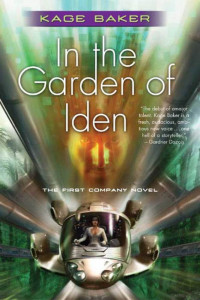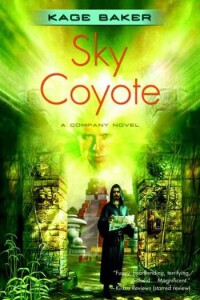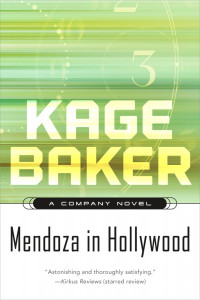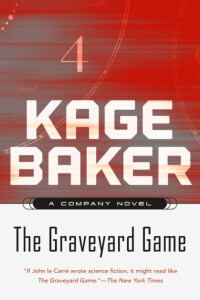The Company series to date consists of four delightful novels that detail the serio-comic (with a very dark edge) adventures of the immortal cyborgs of Dr. Zeus, Inc., a for-profit company that has existed for millennia, giving eternal life to mortals and sending them on historic salvage missions – such as salvaging the contents of the Alexandrian library. Did I mention yet that they quite literally get drunk on high-octane chocolate? Or that they have an almost pathological fascination with the Golden Age of Hollywood? And that they act a lot like the Fey do in terms of dealing with mortals?
But I’m getting ahead of myself. Let’s start at the beginning … What if you discovered that time travel was practical, but only one way – back into the past? You certainly don’t want to be stuck in the past if you’re planning on being very, very rich in the time that you come from. And mortals of the past are both frail and short-lived. Sigh … Damn. But what if you could create immortal cyborgs by using the discards of their societies? (Being rich and clever is very, very good – It also can be a terrible trap if you think too logically.) Now, the process only works on relatively young children, so you yourself will never be immortal. And though there are often horrible side effects, at least in theory you can create a cadre of loyal, extremely strong and intelligent workers who can be used to do your bidding for tens of thousands of years if need be. And the only rule governing your actions is that recorded history can’t be altered. Not because it can’t be changed, but because no one wants to find out what happens if you did. Remember the classic Heinlein story “By His Bootstraps”‘ in which events to change history were to no avail? Or Leiber’s The Big Time, in which time was so changeable that nothing was fixed? It appears Dr. Zeus, Inc. is not interested in risking wealth, long life, and really nice acquisitions on the chance that things might go terribly wrong!
Now, being from the future means that you know when the Alexandrian library will be burned by a pissed-off invader, or when the Titanic will hit the iceberg. Or when the Stock Market will become an anachronism. So just tell your agents in a certain time to rescue that plant species before it becomes extinct, as it will be “discovered” later as a rare cancer-fighting drug; or tell them just to stay out of the way when the the shit hits the fan in that country at a certain point in history such as the French Revolution. Think of the good you can do … Think of the untold wealth that awaits you down the line … Think of how grateful a civilization will be to you … (If they know you exist). But also think of Dr. Zeus, Inc. as an example of what “absolute power” would be like if given millennia to accumulate said power. And would the mortals who own and operate Dr. Zeus, Inc. really, really trust immortal cyborgs who think of them as inferior beings? I think not!
 In the Garden of Iden is the first of the novels in what is called The Company series. As her first assignment, a Company operative named Mendoza, who thinks of herself as an indentured servant to the Company, is sent to England during the reign of Queen Mary to retrieve now-extinct plant specimens from the garden of Sir Walter Iden. The wonderful title is a play upon what Mendoza likes best, as plants make her content, but people for the most part make her very, very unhappy. Now this naturally means that young and virginal – in all senses of that word – Mendoza must have a torrid love affair with someone doomed to die. Like the Fey, these immortals should never fall in love with mortals! Bad, bad idea. But that won’t stop our ever-so-innocent Mendoza from proving to have a mortal heart, as the Fey and these immortals never manage to keep away from mortals. In the Garden of Iden is designed to set up the premise of the series, while establishing that what the cyborgs think the Company is doing may be very different from what the Company is actually doing. In the Garden of Iden does a splendid job of setting up the series by introducing the principle characters, their motivations, and their understanding of what’s going on. I will only say that Mendoza’s love affair ends very horribly – she’s alive, he’s (apparently) quite dead.
In the Garden of Iden is the first of the novels in what is called The Company series. As her first assignment, a Company operative named Mendoza, who thinks of herself as an indentured servant to the Company, is sent to England during the reign of Queen Mary to retrieve now-extinct plant specimens from the garden of Sir Walter Iden. The wonderful title is a play upon what Mendoza likes best, as plants make her content, but people for the most part make her very, very unhappy. Now this naturally means that young and virginal – in all senses of that word – Mendoza must have a torrid love affair with someone doomed to die. Like the Fey, these immortals should never fall in love with mortals! Bad, bad idea. But that won’t stop our ever-so-innocent Mendoza from proving to have a mortal heart, as the Fey and these immortals never manage to keep away from mortals. In the Garden of Iden is designed to set up the premise of the series, while establishing that what the cyborgs think the Company is doing may be very different from what the Company is actually doing. In the Garden of Iden does a splendid job of setting up the series by introducing the principle characters, their motivations, and their understanding of what’s going on. I will only say that Mendoza’s love affair ends very horribly – she’s alive, he’s (apparently) quite dead.
 Sky Coyote begins in pre-Columbian Mexico, where Joseph and Mendoza are reunited at New World One, a plush Company retreat that reminded me a bit of what the elite resorts were like before the Second World War. European conquerors are scheduled to arrive in the New World, so Dr. Zeus Inc. dismantles operations and sends Joseph to California in 1699 to save a Chumash village – every person and their artifacts if possible – before Europeans arrive to bring death and destruction. To prepare the Chumash for their voyage to a Company enclave, which they are told is paradise, Joseph poses as Uncle Sky Coyote, a trickster-god of the Chumash, and tells them he’s there to save them from certain doom at the hands of white men. But can Joseph convince the wary, savvy Chumash, who are far more sophisticated than Dr. Zeus, Inc. think they are, that their God has their best interests at heart? And can Joseph patch things up with Mendoza, who still hasn’t at all forgiven him for what happened in 1500s England? (Uncle Sky Coyote is a hoot – a horny, not terribly attractive Coyote God with Joseph having a surgically implanted tail and ears!) Will Mendoza stopped being depressed?
Sky Coyote begins in pre-Columbian Mexico, where Joseph and Mendoza are reunited at New World One, a plush Company retreat that reminded me a bit of what the elite resorts were like before the Second World War. European conquerors are scheduled to arrive in the New World, so Dr. Zeus Inc. dismantles operations and sends Joseph to California in 1699 to save a Chumash village – every person and their artifacts if possible – before Europeans arrive to bring death and destruction. To prepare the Chumash for their voyage to a Company enclave, which they are told is paradise, Joseph poses as Uncle Sky Coyote, a trickster-god of the Chumash, and tells them he’s there to save them from certain doom at the hands of white men. But can Joseph convince the wary, savvy Chumash, who are far more sophisticated than Dr. Zeus, Inc. think they are, that their God has their best interests at heart? And can Joseph patch things up with Mendoza, who still hasn’t at all forgiven him for what happened in 1500s England? (Uncle Sky Coyote is a hoot – a horny, not terribly attractive Coyote God with Joseph having a surgically implanted tail and ears!) Will Mendoza stopped being depressed?
 Mendoza in Hollywood has Mendoza, our botanist, stuck in drought-plagued southern California in 1862, with a broken heart, truly weird fellow immortals – including one who adopts a pelican – and no plants to study. The situation has gone downhill from Sky Coyote, as drought and the smallpox introduced some centuries earlier by the Europeans have decimated the region, leaving Mendoza with nothing to do but think about her three-centuries-lost mortal love, the burned-at-the-stake Nicholas Harpole. But then something very odd happens – a British agent who’s the spitting image of Nicholas is apparently hell-bent on a plot to undermine the Union in its hour of need. Mendoza decides to assist him in his plot to ensure British rule of the Americas, thereby directly disobeying Dr. Zeus, Inc. Now, keep in mind that nothing is what it seems – so why this British agent is here may have more to do with Dr. Zeus, Inc. than with helping his own government. This novel has more of a screwball comedy feel to it than do the first two – lots of joking references to the once and future Hollywood, which all of the cyborgs seem to be in love with. And there’s a cute subplot involving Oscar, an immortal whose intended task is cultural data collection, but who has become obsessed with his cover, that of a traveling salesman complete with wagon and fancy clothes, and spends the entire book trying to sell a pie safe. A pie safe? Read the book to see if it is what it seems to be …
Mendoza in Hollywood has Mendoza, our botanist, stuck in drought-plagued southern California in 1862, with a broken heart, truly weird fellow immortals – including one who adopts a pelican – and no plants to study. The situation has gone downhill from Sky Coyote, as drought and the smallpox introduced some centuries earlier by the Europeans have decimated the region, leaving Mendoza with nothing to do but think about her three-centuries-lost mortal love, the burned-at-the-stake Nicholas Harpole. But then something very odd happens – a British agent who’s the spitting image of Nicholas is apparently hell-bent on a plot to undermine the Union in its hour of need. Mendoza decides to assist him in his plot to ensure British rule of the Americas, thereby directly disobeying Dr. Zeus, Inc. Now, keep in mind that nothing is what it seems – so why this British agent is here may have more to do with Dr. Zeus, Inc. than with helping his own government. This novel has more of a screwball comedy feel to it than do the first two – lots of joking references to the once and future Hollywood, which all of the cyborgs seem to be in love with. And there’s a cute subplot involving Oscar, an immortal whose intended task is cultural data collection, but who has become obsessed with his cover, that of a traveling salesman complete with wagon and fancy clothes, and spends the entire book trying to sell a pie safe. A pie safe? Read the book to see if it is what it seems to be …
 The Graveyard Game is a much darker, more disturbing novel. We start off with Mendoza way, way in the past doing penance for aiding the British agent. And there are rumors that cyborgs are being terminated by Dr. Zeus, Inc. to squelch a rebellion by the cyborgs. Joseph and Lewis, who have no idea where Mendoza is, have become obsessed with finding her, and in a more ominous subplot, uncover evidence of Company deeds that appear to threaten cyborgs and mortals alike. Joseph discovers underground holding cells, with “sleeping” agents in vats of fluid. Meanwhile, Lewis researches the activities of Edward Bell-Fairfax, the British agent who was with Mendoza when she disappeared. The two get together to discuss their not-going-well quest in the Ghirardelli Square of 1990s San Francisco. Cyborgs get quite literally drunk on chocolate, preferably really good chocolate, and they order round after round of hot cocoa, even ingesting vast numbers of bars, until a Company security officer finds them:
The Graveyard Game is a much darker, more disturbing novel. We start off with Mendoza way, way in the past doing penance for aiding the British agent. And there are rumors that cyborgs are being terminated by Dr. Zeus, Inc. to squelch a rebellion by the cyborgs. Joseph and Lewis, who have no idea where Mendoza is, have become obsessed with finding her, and in a more ominous subplot, uncover evidence of Company deeds that appear to threaten cyborgs and mortals alike. Joseph discovers underground holding cells, with “sleeping” agents in vats of fluid. Meanwhile, Lewis researches the activities of Edward Bell-Fairfax, the British agent who was with Mendoza when she disappeared. The two get together to discuss their not-going-well quest in the Ghirardelli Square of 1990s San Francisco. Cyborgs get quite literally drunk on chocolate, preferably really good chocolate, and they order round after round of hot cocoa, even ingesting vast numbers of bars, until a Company security officer finds them:
On the floor between their respective briefcases is a souvenir bag stuffed with boxes of chocolate cable cars, and the table is littered with foil wrappers from the chocolate they have already consumed. … The security tech scans them and recoils slightly at the level of Theobromos in their systems. He surveys the litter of foil wrappers and empty cups, regarded the cocoa powder in Joseph’s beard, and sighs. Two old professionals on a sloppy bender …
But The Graveyard Game at its heart is suggesting that the immortals have, not surprisingly, been lied to. And that may be very bad news for their masters, as the immortals can’t be killed. Baker never says what the technology is that created them, but Joseph finds the remains of his mentor chopped up into small bits and buried; Joseph resurrects him by using the technology hidden in one of the Dr. Zeus, Inc. bunkers! The confrontation between the cyborgs and their masters is fast approaching – and if Dr. Zeus, Inc. knows what’s going to happen, they’re not saying.
You really need to start with In the Garden of Iden and work your way through the entire series, as this is a true serial with the plot developing nicely along the way. This is some of the best science fiction I’ve ever read, and the time traveling is nicely handled.
(Harcourt Brace, 1997)
(Harcourt Brace, 1999)
(Harcourt, 2000)
(Harcourt, 2001)
